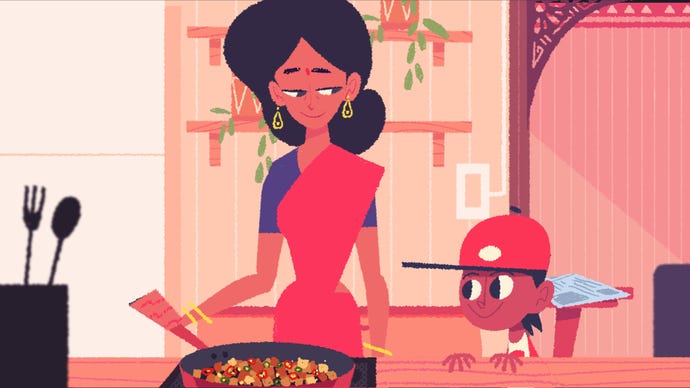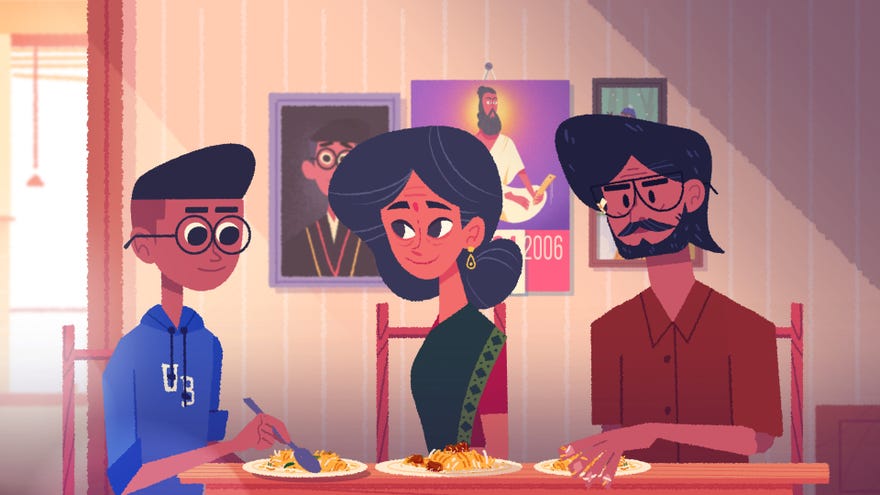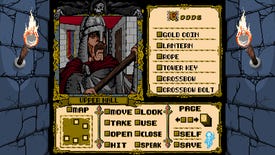Venba review: a brief, but touching cooking puzzler with a heap of heart
I’m not crying, it's the onions
As a massive foodie with a near bottomless appetite, it pained me to watch Venba’s mouth-watering cooking puzzles knowing a similarly tasty-looking treat wasn’t waiting for me in real life. But as a second-generation immigrant, the game’s explorations of that experience hit so surprisingly close to home that I wasn’t left hungry by the time credits rolled. Venba is a touching, smart, and soulful game that made me want to hug everyone in my family immediately. Though, I do wish the game would’ve marinated in its good ideas a while longer.
The game follows the titular Venba, a South Indian woman who moves to Canada with her husband Paavalan in the 1980s. Multiple job rejections and general homesickness have them wanting to make the trip back, but when Venba becomes pregnant with a baby boy (soon-to-be-called Kavin), the newlyweds suddenly have a reason to stay. The following three decades see Venba desperately struggle to close the cultural chasm opening up between herself and her quickly assimilating son - a conflict that’s equal parts heartbreaking and heartwarming.
baad.jpg)
Venba - the game - doesn’t shy away from uncomfortable conversations about generational rifts, parental sacrifice, and the cultural erosion that takes place after immigrating. But the game uses food as a bridge between these topics. Venba - the character - holds onto her Tamil roots by cooking for her family and restoring her own mother’s recipe book that’s sadly been torn, smudged, and blotched in the journey to a new country. The book is a clever device used to represent the cultural erasure that comes with moving, but more importantly, rewriting those recipes is a hopeful way of restoring what was once lost.
Spread across several chapters and decades, you’ll crank up the gas, lay out various colourful ingredients, and get to work recreating dishes from the cookbook that’s been passed down through generations. That cookbook is a lovely little thing as it both challenges and helps you through the small headscratchers. Information is always partly obscured in the book, meaning the challenge comes from deciphering the surviving clues and figuring out how to use any given tool or ingredient, rather than timing-based objectives and whatnot.
For example, the opening recipe has you steaming idlis (small fluffy rice cakes) but the instructions are missing a single step. Laid out on the table are idlis batter, a jug of water, three cloth sheets, and a multi-tiered steaming contraption. The contraption’s trays have holes at regular intervals that let the steam rise out to the surface, and it’s then your job to spin each tier and make sure the batter is positioned directly above said holes. Then, voila.
baad.jpg)
baad.jpg)
Each and every recipe operates on the same real-world logic as that. Frying vegetables? Well, don’t chuck in the tomatoes first! Those let out too much watery juice and your onions won’t bronze properly afterwards. Every puzzle swaps out different ingredients and cooking tools, keeping a brisk pace and teaching you new culinary skills along the way.
But Venba’s brief, hour-long runtime had me feeling like its food had gone to waste somewhat. The game teaches you so many rules but rarely reuses them. That “fry tomatoes last” thing comes back again in one other puzzle, and it makes you feel smart for figuring it out yourself this time, but it also had me yearning for more recycled trials to test everything I’d learned in the kitchen. A proper culinary challenge, in other words, was missing.

A generous hint system makes puzzles forgiving for those who are liable to burn the house down, though, and botching a meal just lets you restart. Figuring everything out was still always a delight for me.
Still, despite its length, Venba still leaves a strong impression once it's over, particularly when it comes to the pure sensory feast that accompanies its cooking. Once that oil heats up, boy oh boy, your ears are going to eat good. Fennel seeds pat pat away, aromatic leaves sizzle, and chucking in chillies will have the juices bursting and cracking and seething as they touch the hot oil. The audio-visual mix is so vibrant you can practically smell the aroma floating off the various pots and pans.
That extends to the incredible soundtrack, too. Before turning the gas knob, Venba turns the radio dial, and boom: thumping percussion, unexpected alt-rock inflections, vocal melodies that worm into your ears, and the whole damn thing fizzes like a firework. It also sometimes mirrors frying sounds. Magic.
I also really admire the cultural details on display, from the traditional recipes and the language used, to the music and decorations. The closer the game zooms into this one specific family, the more universal it feels. Venba feels very authentic and sincere as if these family dynamics and conversations could play out under a neighbour's roof, or my own messy home.
baad.jpg)
The dishes are delightful, but beyond that, the food is cleverly and closely tied to the cultural rifts between Venba and Kavin, too. Tamil cuisine is a source of insecurity for Kavin in his early life, a marker of his otherness at school. As the years steam ahead and he slowly forgets his mother tongue, food is the language he uses to reconnect with his family. Being born into one culture but coming from another creates a divide, and growing up it can often feel easier to jettison the half that feels inconvenient. Venba smartly puts food - something that’s so tied to culture, memory, and the senses - at the centre of that journey.
The result is a heartwarming love letter to immigrant parents, Tamil culture, and the food that raised us.
Even though Kavin’s experience as a second-generation immigrant stuck out to me personally, his parent’s story could have been the juicier one had it been left in the oven a while longer. The game skirts around and sometimes rushes through some interesting topics, like a conflict between Venba and Paavalin that seems to brew early on but fizzles out soon after.
Although there are some elements that could've been improved with more time to bubble on the stove, Venba's visual novel-style conversations and gorgeous cooking puzzles complement each other perfectly. The result is a heartwarming love letter to immigrant parents, Tamil culture, and the food that raised us.













_aplwdb8b8c3.jpg)

